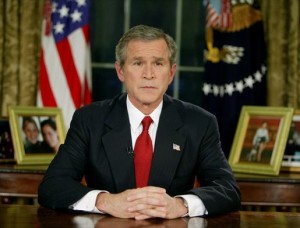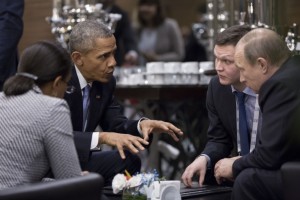How Netanyahu Pulls Trump’s Strings
by Robert Parry - Consortium News
October 15, 2017
Special Report: It turns out that Hillary Clinton was partly correct: President Trump is a “puppet,” but his puppet master isn’t Russian President Putin but Israeli Prime Minister Netanyahu, reports Robert Parry.
 In the final presidential debate of 2016, Hillary Clinton famously called Donald Trump the “puppet” of Russian President Vladimir Putin.
In the final presidential debate of 2016, Hillary Clinton famously called Donald Trump the “puppet” of Russian President Vladimir Putin.But what’s increasingly clear is that Trump has a more typical puppet master for a U.S. politician – Israeli Prime Minister Benjamin Netanyahu.
At the White House from left, U.S. President Donald Trump,
Melania Trump, Sara Netanyahu and Israeli PM Benjamin Netanyahu.
AVI OHAYON/GPO/JINIPIX
Since Sept. 18, when the two men met in New York around the United Nations General Assembly, Netanyahu has been pulling Trump’s strings on almost every foreign policy issue. Arguably, the puppet/puppeteer relationship began much earlier, but I’ve been told that Trump bridled early on at Netanyahu’s control and even showed a few signs of rebellion.
For instance, Trump initially resisted Netanyahu’s demand for a deeper U.S. commitment in Syria by ordering the shutdown of the CIA operation supporting anti-government rebels, along with the Trump administration’s statement that U.S. policy no longer sought “regime change” in Damascus.
Immediately after that announcement, Netanyahu had some success in getting Trump to reverse direction and fire 59 Tomahawk missiles at a Syrian air base on April 6. The attack followed what one intelligence source told me was a staged chemical weapons incident by Al Qaeda operatives in the rebel-controlled town of Khan Sheikhoun in Idlib province, possibly using sarin delivered via drone from a Saudi/Israeli special operations base in Jordan. Yet, although apparently duped by the subterfuge into the missile strike, Trump still balked at a complete reversal of his Syrian policy.
Then, in May, Trump picked Saudi Arabia and Israel as his first overseas trip as president – essentially following the advice of his son-in-law Jared Kushner – but I’m told he came away feeling somewhat humiliated by the over-the-top treatment that involved him getting pulled into a ceremonial sword dance in Saudi Arabia and facing condescension from Netanyahu.
So, over the summer, Trump listened to advice about a possible major overhaul of U.S. foreign policy that would have checked Israeli/Saudi regional ambitions, opened diplomatic doors to Iran, and addressed the Korean crisis by brokering negotiations between the North and the South over some form of loose confederation.
There was even the possibility of a Nixon-goes-to-China moment with tough-guy Trump meeting with Iranian President Hassan Rouhani and the two countries restoring diplomatic ties, a process that could have given U.S. companies a better chance to compete in the Iranian market.
Those proposed moves had the advantage of reducing international tensions, saving the U.S. government money on future military adventures, and freeing U.S. corporations from the tangle of economic sanctions – exactly the “America First” strategy that Trump had promised his working-class base.
However, instead Netanyahu succeeded in pulling Trump’s strings during their conversations on Sept. 18 in New York, although exactly how is still a mystery to some people close to these developments. One source said the Kushner family real-estate company has exposure to substantial Israeli financing that could be yanked, although Jared Kushner’s financial disclosure form only lists a $5 million unsecured line of credit, held jointly with his father, from the Israel Discount Bank.
Trump also has major pro-Netanyahu donors to his political war chest and his legal defense fund who are strong advocates for war with Iran, including casino tycoon Sheldon Adelson, who has plowed $35 million into the pro-Trump Super PAC Future 45 and has publicly called for dropping a nuclear bomb on Iran as a negotiating tactic. So, Netanyahu had a number of potential strings to pull.
Going on Rants
Whatever the precise reasons, on Sept. 19, Trump turned his maiden speech to the U.N. General Assembly into a war-like rant, personally insulting North Korean leader Kim Jong Un as “Rocket Man,” threatening to “totally destroy” his nation of 25 million people, and parroting Netanyahu’s calls for another regime change project aimed at Iran.
 President Trump speaking to the United Nations General Assembly on Sept. 19, 2017. (Screenshot from Whitehouse.gov)
President Trump speaking to the United Nations General Assembly on Sept. 19, 2017. (Screenshot from Whitehouse.gov) Most diplomats in the audience sat in stunned silence as Trump threatened aggressive war from the podium of an organization created to prevent the scourge of war. The one notable exception was Netanyahu who enthusiastically applauded his success in jerking Trump into the neocon camp.
So, rather than shift U.S. policy away from confrontation, Trump jettisoned the diplomatic strategy although it already had dispatched intermediaries to make contacts with the Iranians and North Koreans. Instead, Trump opted for the classic neocon approach favored by Netanyahu, albeit with Trump dressing up his neocon surrender in some “America First” rhetoric.
The U.N. speech left some of the U.S. intermediaries scrambling to explain to their contacts in Iran and North Korea why Trump had repudiated the messages that they had been carrying. Privately, Trump explained to one that he just liked to “zigzag” and that the intended end point hadn’t change.
Some of these tensions surfaced in late September when Secretary of State Rex Tillerson took the extraordinary step of announcing the behind-the-scenes contacts with North Korea during a state visit to China.
“We are probing, so stay tuned,” Tillerson said. “We ask, ‘Would you like to talk?’ We have lines of communications to Pyongyang — we’re not in a dark situation, a blackout.” Tillerson added, “We have a couple, three channels open to Pyongyang … We do talk to them. ,,, Directly. We have our own channels.”
In reaction to Tillerson’s efforts to salvage the backchannel initiatives, Trump showed that his obeisance to Netanyahu and the neocons outweighed loyalty to either his Secretary of State or the intermediaries who had ventured into dicey situations on Trump’s behalf.
In Twitter messages, Trump belittled the idea of a dialogue with North Korea, tweeting: “I told Rex Tillerson, our wonderful Secretary of State, that he is wasting his time trying to negotiate with Little Rocket Man.”
“Save your energy Rex,” Trump added, before slipping in another thinly veiled threat of a military strike: “we’ll do what has to be done!”
While on the surface, Trump’s repudiation of Tillerson might have been viewed as another “zigzag,” it is now clear that Trump’s “zigzag” explanation was just another lie. Rather than zigzagging, he is instead following a straight line marked out by Netanyahu.
Meanwhile, in Syria, Netanyahu seems to have won more concessions from Trump. The U.S. military appears to be helping the remnants of Islamist forces still fighting the government, according to Russian officials. Their accusation is that the U.S. is secretly aiding the Islamist terror groups with weapons, tactical advice and aerial reconnaissance.
In other words, Trump appears to be continuing U.S. military intervention in Syria – just as Netanyahu desires.
Falling in Line
Trump further showed that he is following Netanyahu’s marching orders with the extremist speech about Iran on Friday, essentially repeating all the Israeli propaganda lines against Iran and burning whatever bridges remained toward a meaningful diplomatic approach.
 President George W. Bush announcing the start of his invasion of Iraq on March 19, 2003.
President George W. Bush announcing the start of his invasion of Iraq on March 19, 2003. Trump’s Iran speech was so ludicrous it almost defies serious analysis. It ranks with the reckless rhetoric of President George W. Bush when he pronounced an “axis of evil,” with the incongruous linking of Iraq and Iran (two bitter enemies) and North Korea accompanied by Bush’s bogus claims about Iraq’s WMD and Iraq’s alleged collaboration with Al Qaeda.
In Friday’s speech, which looked like the handiwork of John Bolton, one of Bush’s neocon advisers who was seen entering the White House last week, Trump repeated all the nonsense tying Iran to Al Qaeda, presumably thinking that the American people still don’t understand that Al Qaeda is a fanatical Sunni terror group that targets both the West and Shiites, the dominant Muslim faith in Iran, as heretics deserving death.
The inconvenient truth is that Al Qaeda has long been connected to Saudi Arabia, which has supported these fanatics since the 1980s when Saudi citizen Osama bin Laden was supported in his jihad against Soviet troops in Afghanistan, who were there trying to protect a secular regime.
Though officially the Saudi monarchy insists that it is opposed to Al Qaeda, Saudi intelligence has used Al Qaeda as essentially an unconventional fighting force deployed to destabilize and terrorize adversaries in the region and around the world. [For details, see Consortiumnews.com’s “The Need to Hold Saudi Arabia Accountable.”]
As the Israelis have developed a de facto alliance with Saudi Arabia in recent years, they also have expressed a preference for an Al Qaeda victory in Syria if necessary to destroy what Michael Oren, former Ambassador to the U.S. and now a deputy minister under Netanyahu, has described as the Shiite “strategic arc” running from Tehran through Damascus to Beirut.
One of the frequent Israeli complaints about Iran is that it has assisted the sovereign government of Syria in defeating Al Qaeda and its militant allies (as well as Al Qaeda’s spinoff Islamic State), which should tell you a lot about where Netanyahu’s loyalties lie.
A Compromised Media
Yet, as dishonest as Trump’s Iran speech was, the U.S. mainstream media won’t criticize it as harshly as it deserves because virtually all the important journalists and talking heads have swallowed Israel’s anti-Iran propaganda whole. They have frequently repeated the canard about Iran as “the world’s chief sponsor of terrorism” when that title clearly should go to the Saudis and the Qataris if not others.
The West’s major news outlets also have ingested all the sophisticated propaganda against the Assad government in Syria, particularly the claims about chemical weapons attacks while ignoring evidence that Al Qaeda’s operatives and their “civil defense” collaborators have staged attacks with the goal of provoking a direct U.S. military intervention. [See Consortiumnews.com’s “A New Hole in Syria-Sarin Certainty.”]
In his Friday speech, Trump also touted one of the earliest canards about Iranian “terrorism,” the attack by Lebanese Shiite militants on the U.S. Marine barracks in Beirut in 1983 killing 241 Americans.
When that attack happened, I was working at The Associated Press as an investigative reporter specializing in national security issues. While the precise Iranian role was not clear, what should have been obvious was that the attack was not “terrorism,” which is classically defined as violence toward civilians to achieve a political goal.
Not only were the Marines not civilians but the Reagan administration had made them belligerents in the Lebanese war by the decision to order the USS New Jersey to shell Muslim villages. Reagan’s National Security Advisor Robert McFarlane, who often represented Israel’s interests inside the administration, was the spark plug for this mission creep, which killed Lebanese civilians and convinced Shiite militants that the United States had joined the war against them.
Shiite militants struck back, sending a suicide truck bomber through U.S. security positions, demolishing the high-rise Marine barracks in Beirut. Reagan soon repositioned the surviving U.S. forces offshore. At the AP, I unsuccessfully argued against calling the Beirut attack “terrorism,” a word that other news organizations also sloppily applied. But even senior Reagan officials recognized the truth.
“When the shells started falling on the Shiites, they assumed the American ‘referee’ had taken sides,” Gen. Colin Powell wrote in his memoir, My American Journey. In other words, Powell, who was then military adviser to Defense Secretary Caspar Weinberger, recognized that the actions of the U.S. military had altered the status of the Marines in the eyes of the Shiites.
(Although this “terrorism” is always blamed on Hezbollah, the group did not officially come into existence until 1985 as a resistance movement against the Israeli occupation of Lebanon which did not end until 2000.)
Opposed to Putin
So, Trump is now on the path to wars with both North Korea and Iran, neither of which Russian President Putin favors. Putin, who played a key role in helping President Obama achieve the Iran-nuclear agreement, now sides with the Europeans in opposition to Trump’s decertification.
President Barack Obama meets with President Vladimir Putin of Russia on the sidelines of the G20 Summit at Regnum Carya Resort in Antalya, Turkey, Sunday, Nov. 15, 2015. National Security Advisor Susan E. Rice listens at left. (Official White House Photo by Pete Souza)
Putin also favors a prompt end to the Syrian conflict with the defeat of Al Qaeda and its allies, and he wants peaceful negotiations with North Korea over its desire for security against threatened American aggression. Trump is on the opposite side of all these Putin priorities.
In other words, not only does the Russia-gate hysteria have core evidentiary problems – both on the issues of “hacking” Democratic emails and claims about suspected “Russia-linked” entities paying for an infinitesimal number of ads on social media (including some about puppies and another promoting a critical documentary about Donald Trump’s golf course in Scotland) – but Trump is behaving in ways that are directly contrary to Putin’s desires and interests.
If indeed Clinton were right that Trump was Putin’s “puppet,” then he would have agreed to negotiations to address the North Korean crisis; would have accepted constructive diplomacy toward Iran; and would have ended all U.S. support for the Syrian militants and encouraged a quick end to the bloodletting.
Instead, Trump is moving in opposite directions, lining up with Netanyahu and the neocons, whom some European allies refer to as “America’s Israeli agents.” Although dressing up his capitulation to Netanyahu in tough-guy phrasing, Trump is doing what most U.S. politicians do – they grovel before Bibi Netanyahu.
And, if you have any doubts about that reality, you can watch how often both Republicans and Democrats jump to their feet when Netanyahu addresses a joint session of Congress, an honor that he has received three times, tying him with British Prime Minister Winston Churchill.
Those moments of American humiliation – as almost all 535 members of Congress act like puppets on invisible strings – represent the actual subservience of the U.S. government to a foreign power. And that power is not Russia.
President Trump is just the latest American politician to have his strings yanked by Israeli Prime Minister Netanyahu.
Investigative reporter Robert Parry broke many of the Iran-Contra stories for The Associated Press and Newsweek in the 1980s. You can buy his latest book, America’s Stolen Narrative, either in print here or as an e-book (from Amazon and barnesandnoble.com).


No comments:
Post a Comment